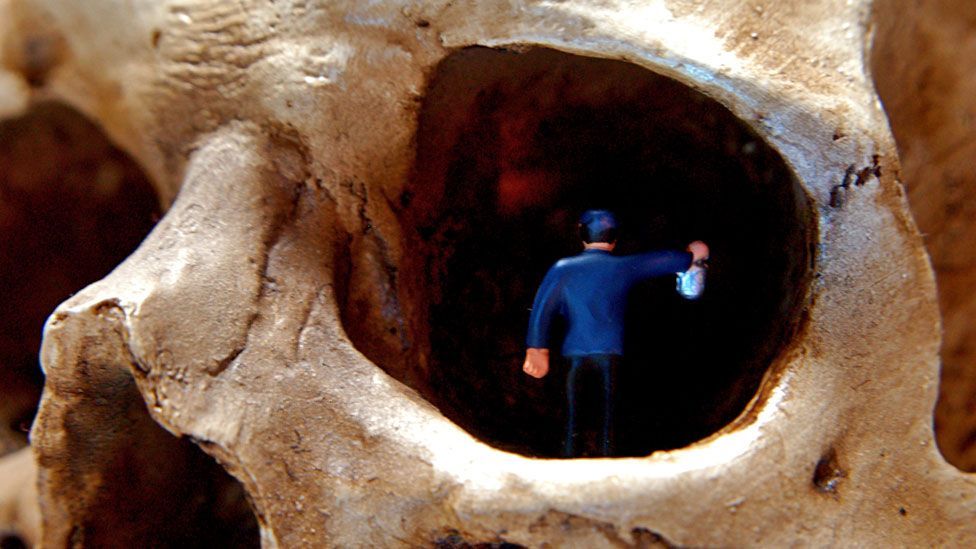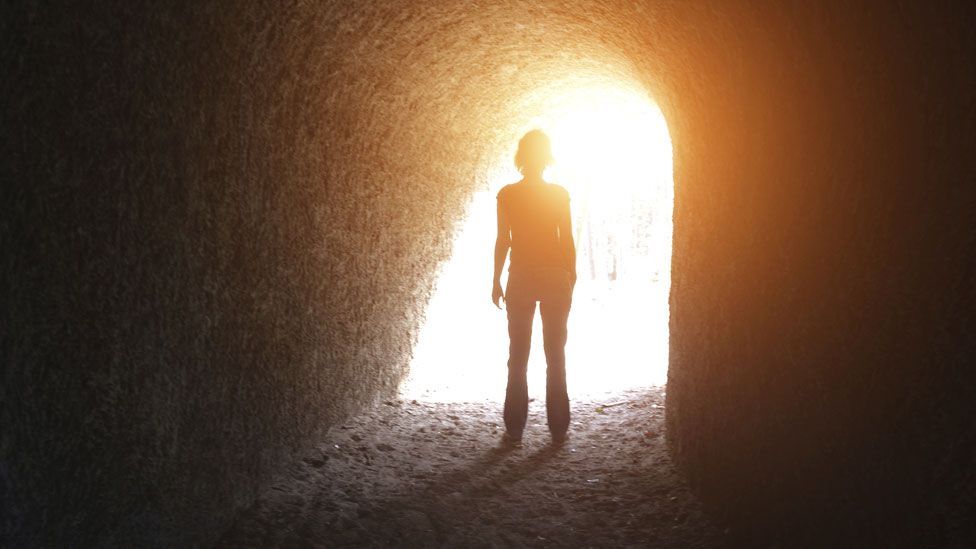In What Ways Are Attitudes Toward Death Changing Psychology
Why contemplating death changes how you lot call up
(Image credit:
Flickr/JD Hancock/CC By 2.0
)

Reading this article could temporarily change your politics, biases and decision-making – information technology might fifty-fifty brand you want to be famous. Why? The very idea of death changes our thoughts in profound ways.
I
If death is the final taboo, information technology might not exist for much longer. There has, in recent years, been increasing effort to promote conversations about death and dying, both in the home and in more public settings. For example, death cafes, first launched in Switzerland in 2004, take spread around the world, enabling people to speak almost their fears over cake and coffee.
Our reluctance to talk most death is frequently taken equally evidence that we are afraid, and therefore suppress thoughts nigh it. However, there is little direct evidence to support that nosotros are. So what is a "normal" amount of death anxiety? And how does information technology manifest itself?
Judging by studies using questionnaires, we seem more bothered past the prospect of losing our loved ones than we do nearly dying ourselves. Such studies too testify that we worry more about the dying process – the pain and loneliness involved, for case – than about the stop of life itself. In general, when we are asked if we are agape to die, most of u.s. deny it, and written report only mild levels of anxiety. The minority who report high levels of expiry feet are even considered psychologically abnormal – thanatophobic – and recommended for treatment.

Information technology only takes a few thoughts of the grave to modify your biases (Credit: iStock)
On the other hand, our tendency to report only depression levels of death feet might be a consequence of our reluctance to admit to our fear, to others and ourselves. Based on this hypothesis, social psychologists have, for nearly 30 years now, examined the social and psychological furnishings of beingness confronted with our own bloodshed. In well over 200 experiments, individuals take been instructed to imagine themselves dying.
The offset study of this kind was conducted on The states municipal court judges, who were asked to set bail for an alleged prostitute in a hypothetical scenario. On average, judges who were confronted with their bloodshed beforehand set a much higher bail than those who were not confronted – $455 versus $50 (£315 vs £35). Since then, many other effects accept been found among groups including the full general population in many different countries.
Besides making us more than punitive, thinking nearly decease too increases our nationalistic bias, makes us more prejudiced against other racial, religious and age groups, and leads to other such parochial attitudes. Taken together, these dozens of studies show that being reminded of decease strengthens our ties to the groups we belong to, to the detriment of those who are different from united states.
Reminders of death also affect our political and religious beliefs in interesting ways. On the one manus, they polarise us: political liberals become more liberal while conservatives go more conservative. Similarly, religious people tend to assert their beliefs more fervently while nonreligious people disavow more.

Research suggests we seem more bothered by the prospect of losing our loved ones than nosotros do most dying ourselves (Credit: iStock)
On the other hand, these studies have also plant that thinking well-nigh decease tempts us all – religious or otherwise – towards more than religious conventionalities in subtle, perchance unconscious ways. And when the reminder of expiry is sufficiently powerful and when participants are not mindful of their prior political commitments, liberals every bit well as conservatives tend to endorse conservative ideas and candidates. Some researchers claim that this could explain the US political shift to the right after 9/eleven.
But why does death make usa more punitive, conservative and religious? According to many theorists, reminders of death compel us to seek immortality. Many religions offer literal immortality, but our secular affiliations – such every bit our nation states and ethnic groups – can provide symbolic immortality. These groups and their traditions are a function of who we are, and they outlive us. Defending our cultural norms can boost our sense of belonging and being more than castigating against individuals who violate cultural norms – such as prostitutes – is symptom of this.
Consistent with this interpretation, researchers have too establish that reminders of decease increase our desire for fame and for children, both of which are commonly associated with symbolic immortality. Information technology turns out that we do desire to exist immortalised through our piece of work and our Dna.

Thinking of death can change how conservative your decisions are (Credit: iStock)
When asked, we do not seem, perhaps not even to ourselves, to fear death. Nor would we judge that thinking about death has such widespread effects on our social attitudes. But there are limits to our introspective powers. We are notoriously bad at predicting how we will experience or bear in some futurity scenario, and nosotros are similarly bad at working out why we experience the way we practise, or even why we have behaved a certain way. So, whether we realise it or not, it seems that to bring death to the surface of our minds is to open Pandora'due south box.
So what should we make of these new efforts to demystify death and dying through conversation? It is difficult to say. Increasing death'south profile in our imaginations, private and public, might make us all more castigating and prejudiced, as the research found. But and then perhaps we become these negative furnishings precisely because nosotros are unaccustomed to thinking and talking almost death.
In exposure therapy, advisedly exposing patients to the source of their feet – an object, an beast, or even a retentivity – reduces their fear. In the aforementioned way, maybe this most recent taboo-breaking trend will inoculate us psychologically, and brand us stronger in the confront of death.
This articleoriginally appearedon The Chat, and is republished under a Creative Eatables licence.
Join 500,000+ Future fans by liking united states of america on Facebook , or follow the states on Twitter , Google+ , LinkedIn and Instagram
If you liked this story, sign upward for the weekly bbc.com features newsletter , called "If You Just Read half dozen Things This Week". A handpicked pick of stories from BBC Future, World, Civilization, Capital, Travel and Autos, delivered to your inbox every Friday.
![]()
In What Ways Are Attitudes Toward Death Changing Psychology,
Source: https://www.bbc.com/future/article/20160208-why-contemplating-death-changes-how-you-think
Posted by: thorntonxvier1937.blogspot.com


0 Response to "In What Ways Are Attitudes Toward Death Changing Psychology"
Post a Comment